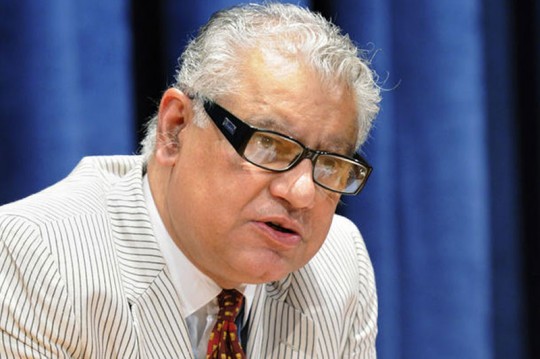UN expert urges Viet Nam to close compulsory rehabilitation centres for drug users
UN expert urges Viet Nam to close compulsory rehabilitation centres for drug users
 Anand Grover, UN Special Rapporteur on the right to health. UN Photo/Evan Schneider
Anand Grover, UN Special Rapporteur on the right to health. UN Photo/Evan Schneider
A United Nations expert urged Viet Nam today to close down its compulsory rehabilitation centres for sex workers and drug users, stressing that detention and forced treatment violate their right to health and perpetuate stigmatization and discrimination of those groups in the society.
“Detainees are denied the right to be free from non-consensual treatment as well as the right to informed consent in all medically related decisions,” said Special Rapporteur on the right to health Anand Grover, who concluded his visit to the country today.
Mr. Grover called the practices “ineffective and counterproductive,” and encouraged the Government to close down the centres and instead support its population’s participation in formulating and implementing all decisions regarding their health.
I wholeheartedly support the closure of the rehabilitation centres.
“I wholeheartedly support the closure of the rehabilitation centres,” said Mr. Grover. “It is essential to ensure that the considerable resources now invested in these centres are used instead to expand alternative treatments for injecting drug users.”
Mr. Grover praised the Government for starting pilot community-based initiatives and methadone programmes, which help reduce withdrawal symptoms in drug users and are “less costly and more effective in reducing drug use and facilitating the reintegration of injecting drug users back into the society.”
###
About Office of the United Nations High Commissioner for Human Rights (OHCHR)
Who we are
The Office of the United Nations High Commissioner for Human Rights (OHCHR) represents the world’s commitment to universal ideals of human dignity. We have a unique mandate from the international community to promote and protect all human rights.
Leadership
The High Commissioner for Human Rights is the principal human rights official of the United Nations. The High Commissioner heads OHCHR and spearheads the United Nations’ human rights efforts. We offer leadership, work objectively, educate and take action to empower individuals and assist States in upholding human rights. We are a part of the United Nations Secretariat with our headquarters in Geneva.
The Office’s priorities are set out in two key strategic documents: the OHCHR Plan of Action and its Strategic Management Plan 2010-2011. These priorities include greater country engagement, working closely with our partners at the country and local levels, in order to ensure that international human rights standards are implemented on the ground; a stronger leadership role for the High Commissioner; and closer partnerships with civil society and United Nations agencies.
United Nations human rights system
We also support the work of the United Nations human rights mechanisms, such as the Human Rights Council and the core treaty bodies set up for monitoring State Parties’ compliance with international human rights treaties, promote the right to development, coordinate United Nations human rights education and public information activities, and strengthens human rights across the United Nations system. We work to ensure the enforcement of universally recognized human rights norms, including through promoting both the universal ratification and implementation of the major human rights treaties and respect for the rule of law.
Our structure
We have an office at United Nations headquarters in New York and offices in numerous countries and regions. In addition to the Executive Office of the High Commissioner and a number of units that report to the Deputy High Commissioner, OHCHR has two major divisions and four branches.
To implement our comprehensive mandate, we employ more than 850 staff (last update in April 2007), based in Geneva and New York and in 11 country offices and seven regional offices around the world, including a workforce of some 240 international human rights officers serving in UN peace missions. We are funded from the United Nations regular budget and from voluntary contributions from Member States, intergovernmental organizations, foundations and individuals.
###
> United Nations (UN).
 The United Nations was established on 24 October 1945 by 51 countries committed to preserving peace through international cooperation and collective security. Today, nearly every nation in the world belongs to the UN: membership totals 192 countries.
The United Nations was established on 24 October 1945 by 51 countries committed to preserving peace through international cooperation and collective security. Today, nearly every nation in the world belongs to the UN: membership totals 192 countries.
When States become Members of the United Nations, they agree to accept the obligations of the UN Charter, an international treaty that sets out basic principles of international relations. According to the Charter, the UN has four purposes:
- to maintain international peace and security;
- to develop friendly relations among nations;
- to cooperate in solving international problems and in promoting respect for human rights;
- and to be a centre for harmonizing the actions of nations.
###
* The above story is adapted from materials provided by United Nations (UN)
** More information at United Nations (UN)




















